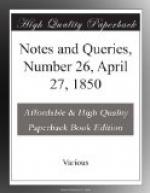C.I.R.
The Complaynt of Scotland.—I believe there has not been discovered recently any fact relative to the authorship of above-mentioned poem, and that the author is,
“Sir David Lyndsay of the Mount,
Lord Lyon King-at-Arms.”
W.B.
Note Books (No. 3. p. 43., and No. 7. p. 104.)—I beg to state my own mode, than which I know of none better. I have several books, viz., for History, Topography, Personal and Family History, Ecclesiastical Affairs, Heraldry, Adversaria. At the end of each volume is an alphabet, with six columns, one for each vowel; in one or other of which the word is entered according to the vowel which first appears in it, with a reference to the page. Thus, bray would come under B.a; church under C.u.; and so forth.
S.S.S.
* * * * *
MISCELLANIES.
MSS. of Casaubon.—There is a short statement respecting certain MSS., now existing, of the great critic Casaubon, in a recent volume of the Parker Society—Whitaker’s Disputation on Holy Scripture, edited and translated by Professor Fitzgerald, Professor of Moral Philosophy, Dublin, which I conceive is one of those facts which might be of service at some future time to scholars, from having been recorded in your columns:—
Whitaker having observed—
“One Herman, a most
impudent papist, affirms that the scriptures
are of no more avail than
Aesop’s fables, apart from the
testimony of the church.”—(Parker
Soc. transl., p. 276.)
Professor Fitzgerald appends the following “note:”—
“Casaubon, Exercit. Baron. I. xxxiii. had, but doubtfully, attributed this to Pighius; but in a MS. note preserved in Primate Marsh’s library, at St. Sepulchre’s, Dublin, he corrects himself thus: ’Non est hic, sed quidam Hermannus, ait Wittakerus in Praefat. Controvers. I. Quaest. S. p. 314.’ If a new edition of those Exercitations be ever printed, let not these MSS. of that great man, which, with many other valuable records, we owe to the diligence of Stillingfleet and the munificence of Marsh, be forgotten.”
T.
Bath
* * * * *
ON A VERY TALL BARRISTER NAMED “LONG.”
Longi longorum longissime, Longe, virorum,
Dic mihi, te quaeso, num Breve
quicquid habes?
W.(1.)
* * * * *
“NEC PLURIBUS IMPAR.”
On a very bad book: from the Latin of Melancthon.
A thousand blots would never cure this
stuff;
One might, I own, if it were large enough.
RUFUS.
* * * * *
Close Translation.—The following is a remarkable instance; for it is impossible to say which is the original and which the translation, they are so nearly equivalent:—




